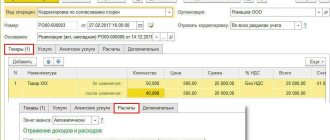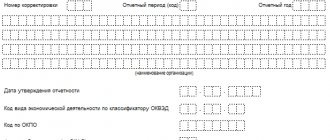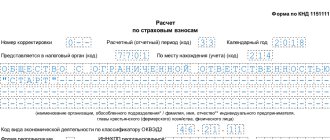According to Art. 81 of the Tax Code of the Russian Federation, if the taxpayer, after filing a return (for VAT, income tax, simplified tax system, 3-NDFL), did not fully enter the necessary information or made, and subsequently discovered, errors leading to an understatement of the tax amount, then he needs to send it to the tax office declaration. A covering letter is attached to the document; it can also be called an explanatory note to the updated declaration. Let us explain what information it should contain.
- Form and sample
- Free download
- Online viewing
- Expert tested
FILES
What is considered an error in the declaration
Article 81 of the Tax Code of the Russian Federation mentions inaccurate information in the declaration and errors themselves. Inaccurate information is incorrectly indicated amounts of income, expenses, results of financial and economic activities, taxes payable. Errors mean an incorrectly specified tax period or date, arithmetic errors, violation of the procedure for filling out the declaration, incorrectly specified codes (TIN, KPP, KBK, OKTMO, etc.) .
Inaccurate information and errors in declarations may not in any way affect the amount of tax that must be paid, but may reduce or increase it. The need to file an updated tax return depends on how errors and inaccurate information affect the tax amount.
Significance of errors
All situations where corrections are made concern only significant errors. If an accountant finds a minor blemish or inaccuracy, then, regardless of the period of discovery, corrective entries are made for the current period. That is, the previous reporting period is not affected and new corrective financial reports are not compiled.
Therefore, is it possible to submit an adjustment to the annual financial statements if there is a minor blot? No you can not. Corrections are made only for significant errors.
PBU 22/2010 states that an error is considered significant if, individually or in combination with other errors for the same reporting period, it can affect the economic decisions of users made on the basis of the financial statements prepared for this reporting period. The significance of the error is determined by the organization independently, taking into account its magnitude and the nature of the relevant article (articles) of the financial statements.
The procedure for determining materiality is fixed in the accounting policy:
“An error is considered significant if its value distorts the indicator of any line of the report by more than 10%.”
To make adjustments to accounting data, a retrospective recalculation method is used. In other words, all financial statements indicators are subject to recalculation under the condition as if the identified error had never been committed. Entities maintaining simplified accounting have the right not to use the retrospective method of recalculation.
When is a taxpayer required to file an amended tax return?
Everything is very simple here, if the amount of tax payable is underestimated, that is, the interests of the budget suffer, then filing an updated declaration is the responsibility of the taxpayer (clause 1 of Article 81 of the Tax Code of the Russian Federation). If errors in the initial declaration did not reduce the amount of tax or an overpayment to the budget occurred, then the taxpayer has the right, but not the obligation, to submit an updated declaration.
The period for which an update can be submitted is not limited by law. Even if more than three years have passed since the filing of the erroneous return (the depth of the on-site audit), the taxpayer is required to file an updated return if he has discovered a tax arrears.
Please note that the taxpayer must detect errors or inaccurate information in the primary declaration on his own . If they are found by the tax inspectorate as a result of an audit or reconciliation of calculations, then the amounts of arrears or overpayments of tax are recorded in the results of the audit.
As for overpayment of tax to the budget, before submitting an updated tax return, it is worth assessing the feasibility of this step. The fact is that if the tax base is understated (that is, the tax was overpaid as a result of overestimating income or understating expenses), the tax inspectorate can conduct an on-site audit for the period for which the updated tax return was filed.
In addition, to confirm the fact of overpayment of tax, it will be necessary to submit to the Federal Tax Service the documents on the basis of which the updated declaration has been prepared (agreements with counterparties, primary and payment documents, invoices). If you are sure that you are right, you can confirm it with documents, and the amount of overpayment is significant, then it is really worth submitting an amendment.
Penalties for late payment of monthly advance payments and income tax
According to para.
2 p. 3 art. 58 of the Tax Code of the Russian Federation, in the case of payment of advance payments later than the deadlines established by the legislation on taxes and fees, penalties are accrued for the amount of late advance payments in the manner prescribed by Art. 75 of the Tax Code of the Russian Federation. In this case, the procedure for calculating penalties does not depend on whether the corresponding advance payments are paid during or at the end of the reporting period, or whether they are calculated on the basis of the tax base determined under Art. 53 and 54 of the Tax Code of the Russian Federation and reflecting the real financial results of the taxpayer’s activities.
Penalties for failure to pay advance tax payments on time are subject to calculation until the date of their actual payment or, in case of non-payment, until the due date for payment of the relevant tax.
If, at the end of the tax period, the amount of calculated tax turned out to be less than the amount of advance payments due during this tax period, it must be assumed that penalties accrued for non-payment of these advance payments should be proportionately reduced.
This procedure must also be applied if the amount of advance payments for tax calculated at the end of the reporting period is less than the amount of advance payments payable during this reporting period (clause 14 of the Resolution of the Plenum of the Supreme Arbitration Court of the Russian Federation dated July 30, 2013 No. 57, letters of the Ministry of Finance Russia dated January 22, 2010 No. 03-03-06/1/15, Federal Tax Service of Russia dated November 13, 2009 No. 3-2-06/127).
Example 2.
The organization discovered an error in the declaration for the nine months of 2016 in the amount of 750,000 rubles. in March 2021.
She submitted the updated declaration on March 18, 2017, having previously (03/17/2017) paid off the arrears and transferred penalties.
The amount of tax subject to additional payment at the end of the year is determined taking into account the adjusted tax amount for nine months.
Monthly advance payments in the fourth quarter of 2021 and the first quarter of 2021, according to the initial declaration, amounted to RUB 3,000,000.
The actual income tax for the fourth quarter of 2021 is equal to RUB 9,300,000.
The organization makes advance payments based on the results of the first quarter, half a year and nine months, plus monthly advance payments within each quarter.
Let's calculate the amount of penalties that the company needs to pay, taking into account the fact that the company's error led not only to non-payment of income tax for the nine months of 2021, but also to incomplete payment of monthly advance payments in the fourth quarter of 2021 and the first quarter of 2021. (Calculation figures are given in thousand rubles.)
| Deadline for making monthly advance payment | Payment according to the original declaration | Additional advance payment* | Updated payment | Incomplete payment of the monthly advance payment for calculating penalties** | Total amount (cumulative total) for calculating penalties |
| 28.10.2016 | 3 000 | 250 | 3 250 | 100 | 850 (750 + 100) |
| 28.11.2016 | 3 000 | 250 | 3 250 | 100 | 950 (850 + 100 |
| 28.12.2016 | 3 000 | 250 | 3 250 | 100 | 1 050 (950 + 100) |
| 30.01.2017*** | 3 000 | 250 | 3 250 | 250 | 1 300 (1 050 + 250) |
| 28.02.2017 | 3 000 | 250 | 3 250 | 250 | 1 550 (1 300 + 250) |
* 750 thousand rubles.
/ 3 = 250 thousand rubles. ** Due to the fact that the actual income tax for the fourth quarter of 2021 amounted to 9,300 thousand rubles, for the purpose of calculating penalties, the monthly advance payment should not exceed 3,100 thousand rubles. (9,300 thousand rubles / 3). This means that the incomplete payment of the monthly advance payment in the fourth quarter of 2016 is not 250 thousand rubles, but 100 thousand rubles. (3,100 – 3,000). *** Due to the fact that January 28, 2021 is a Saturday, the due date for the monthly advance payment has been postponed to January 30, 2021. Penalties are calculated taking into account unpaid monthly advance payments for the following periods:
| The period for which penalties are calculated | Number of days in the period | Refinancing rate, % | Amount of arrears, rub. | Penalties accrued, rub. | |
| 29.10.2016 | 28.11.2016 | 31 | 10 | 850 000 | 8 783,33 |
| 29.11.2016 | 28.12.2016 | 30 | 10 | 950 000 | 9 500,00 |
| 29.12.2016 | 30.01.2017 | 33 | 10 | 1 050 000 | 11 550,00 |
| 31.01.2017 | 28.02.2017 | 29 | 10 | 1 300 000 | 12 566,67 |
| 01.03.2017 | 17.03.2017 | 17 | 10 | 1 550 000 | 8 783,33 |
| Total | 40 993,53 | ||||
Thus, before submitting an updated return, the taxpayer must pay:
- underestimated income tax for the nine months of 2021 – RUB 750,000;
- underestimated monthly advance payments for the fourth quarter of 2016 - 300,000 rubles. (RUB 100,000 x 3);
- reduced monthly advance payments for the first quarter of 2021 - 500,000 rubles. (RUB 250,000 x 2);
- penalties – RUB 40,993.53.
How to file an updated declaration
There is no special form for the updated declaration, but here it must be taken into account that the corrected information must be submitted on the form that was in force during that tax period (clause 5 of Article 81 of the Tax Code of the Russian Federation). For example, if in 2021 you discovered an error in the declaration under the simplified tax system for 2021, then you must submit an updated declaration using the form that was relevant in 2021.
The updated declaration does not indicate the difference between erroneous and correct values, but only the new correct indicators. The title page will also be different, since a different correction number must be indicated on it. In the initial declaration, “0” is written in the field with the adjustment number; in the first updated declaration it will be “1”. If another clarification is submitted during the same period, then the value of the corresponding field will be “2”, etc. The number of clarifications of the declaration is not limited by law.
If you are submitting an updated declaration for the period before January 1, 2014, when OKATO codes were in effect (they have now been replaced by OKTMO codes), then indicate exactly them. But if, on the basis of this adjusted declaration, you must pay arrears of tax for the period before 2014, then only the OKTMO code can be indicated in the payment order.
The Tax Code does not require any explanations to be attached when submitting an updated declaration; however, it is recommended to submit an explanatory note along with it. All the same, the tax office will most likely ask for an explanation during a desk audit of the amended declaration.
In your explanatory note please indicate:
- what tax return you are submitting and for what period;
- what inaccurate information or errors are contained in the primary declaration;
- in which fields of the updated declaration the primary and corrected values of the indicators are indicated;
- calculation of the tax base and calculated tax (if these amounts have changed);
- copies of payment documents confirming payment of arrears and penalties, if they were paid before filing the updated declaration.
The procedure for calculating penalties
As follows from paragraph 3 of Art.
75 of the Tax Code of the Russian Federation, penalties are accrued for each calendar day of delay in fulfilling the obligation to pay income tax, starting from the day following the tax payment established by law (unless otherwise provided for in Chapter 25 of the Tax Code of the Russian Federation). According to paragraph 4 of Art. 75 of the Tax Code of the Russian Federation, penalties for each day of delay are determined as a percentage of the unpaid tax amount. The interest rate of penalties is assumed to be equal to 1/300 of the refinancing rate of the Central Bank of the Russian Federation in force at that time.
Please note: from January 1, 2021, instead of the refinancing rate, the key rate of the Bank of Russia is applied (Resolution of the Government of the Russian Federation dated December 8, 2015 No. 1340).
The Bank of Russia has set the following key rates:
– from May 2, 2021 – 9.25% (Information dated April 28, 2017); – from March 27, 2021 – 9.75% (Information dated March 24, 2017); – from September 19, 2016 – 10.0% (Information dated September 16, 2016); – from June 14, 2021 – 10.5% (Information dated June 10, 2016); – from January 1, 2021 – 11% (Information from 12/11/2015 and from 07/31/2015).
P = ZN x KS / 300 x D, where:
P – amount of penalties; ZN – tax debt; KS – key rate of the Central Bank of the Russian Federation; D – the number of calendar days in the period when the key rate and the amount of debt did not change.
Penalties are accrued starting from the day following the tax payment established by law (clause 3 of Article 75 of the Tax Code of the Russian Federation).
As for the last day for calculating penalties, today there are two opinions on this matter. First, penalties are accrued on the day preceding the day of their payment (clause 2 of section VII of the appendix to the Order of the Federal Tax Service of Russia dated January 18, 2012 No. YAK-7-1 / [email protected] , Letter of the Ministry of Finance of Russia dated July 5, 2016 No. 03-02 -07/2/39318). The second - on the day of actual repayment of the arrears (clause 57 of the Resolution of the Plenum of the Supreme Arbitration Court of the Russian Federation dated July 30, 2013 No. 57).
The author adheres to the second opinion, and in practical examples, the calculation of penalties will be carried out taking into account the day of repayment of the arrears.
Please note: from October 1, 2021, clause 4 of Art. 75 of the Tax Code of the Russian Federation will be presented in a new edition (amended by Federal Law No. 401-FZ of November 30, 2016).
The interest rate of penalties for organizations is assumed to be equal to:
- for delay in fulfilling the obligation to pay tax for a period of up to 30 calendar days (inclusive) - 1/300 of the refinancing rate of the Central Bank of the Russian Federation in force at that time;
- for delay in fulfilling the obligation to pay tax for a period of more than 30 calendar days - 1/300 of the refinancing rate in force for the period up to 30 calendar days (inclusive) of such delay, and 1/150 of the refinancing rate in force for the period starting from the 31st calendar day of such delay delays.
Calculate the amount of penalties using our Penalty Calculator. He will calculate not only penalties for taxes, contributions and fees, but also for unpaid wages on time and penalties for late payment of utilities. There is an opinion that when calculating tax penalties, the day of payment of the overdue payment is not included (letter of the Ministry of Finance dated 07/05/2016 N 03-02-07/2/39318), however, the Federal Tax Service has always thought differently, so our calculator takes into account the point of view of the tax authorities services.
Responsibility for filing an amended tax return
Of course, taxpayers are concerned whether any sanctions may be applied to them for filing an update. Maybe it’s better to wait until the tax inspector discovers these errors and false information on his own (but he may not find it)? Or, after all, the sword does not cut off a guilty head? Not always.
There is no liability for the fact of filing an updated declaration. However, depending on the deadline for its submission and the presence of tax arrears (if, upon clarification, the tax amount turned out to be higher than in the initial declaration), the following situations may arise:
- The corrected information was submitted within the reporting campaign deadlines. For example, on February 10, 2021, the organization filed an initial declaration under the simplified tax system for 2021, in which errors or inaccurate information were quickly discovered. If the updated declaration is submitted by the end of March 2021, then no negative consequences will arise at all. In this case, it is recognized that the initial declaration was submitted on the day the amendment was submitted.
- The deadline for submitting the declaration has passed, but there is still a deadline to pay the tax. So, for UTII this may be the period between July 20 and July 25 based on the results of the second quarter. There will be no sanctions against the taxpayer unless he found the error himself and did not learn about it as a result of a desk audit of the primary declaration or from a message about the appointment of an on-site audit. And, of course, the tax must be paid on time.
- The deadline for submitting the declaration and paying the tax has expired (in the case of UTII - after the 25th day of the month following the reporting quarter). Important - before submitting an updated declaration, you must pay the amount of arrears of tax and penalties (clause 4 of Article 81 of the Tax Code of the Russian Federation). In this case there will be no fine.
- A situation where a fine for violating tax calculations cannot be avoided - if the taxpayer learned about false information or errors that underestimated the amount of tax from the tax inspectorate. In addition to tax arrears and penalties, you will also have to pay a fine under Art. 122 Tax Code (in the amount of 20% of the unpaid tax amount).
Adjustments after submission of the report
The procedure for making changes to an already submitted annual financial report is regulated at the legislative level, in principle, as are the rules for preparing accounting reports. Order of the Ministry of Finance dated June 28, 2010 No. 63n, or PBU 22/2010, establishes the key rules for adjusting accounting records after the reporting date.
The action algorithm depends on the date the error was discovered, on the degree of its materiality, significance, and on whether the financial statements were approved by the owners of the company or not. Note that the adjustment of financial statements is carried out by analogy.
For one situation, adjustment is impossible, but for another it is mandatory. Let's figure out what actions the accountant should take in each case and whether it is necessary to submit an updated balance sheet for previous periods if the reporting data has changed, but the reporting has already been approved. In this case, the accountant makes corrective entries already in the current period, without changing the data of the reporting year and without submitting an updated balance sheet with attachments. The posting is made using account 84 “Retained earnings or uncovered loss” in correspondence with the account for which a significant inaccuracy was discovered. For example, let's take a situation where depreciation is calculated incorrectly. The wiring looks like this:
Results
Errors are occasionally made during the accounting process.
Having considered the procedure for filing an updated tax return under the simplified tax system, we found out that it is not at all difficult to do. Moreover, it will be better for the organization if the accountant himself finds and corrects inaccuracies in accounting, without waiting for auditors. The main thing to remember is that taxes and penalties must be paid before filing an updated return. You can find more complete information on the topic in ConsultantPlus. Free trial access to the system for 2 days.







